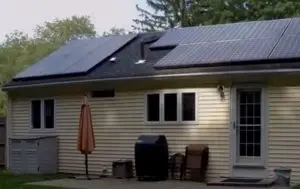Emergency standby generators are very effective at providing backup power when the grid fails. But are there alternatives to these?
What can be used instead of a standby generator?
If you don’t want to use a generator, a battery backup option is an alternative. A battery pack may be used to store part of the extra energy generated by solar panels for usage at night. Batteries may also be charged from any source of energy.
Another option is to use a portable generator. Portable generators are typically used for construction or camping, but can also be used in an emergency situation. They are less expensive than standby generators and can be powered by gasoline, propane, or solar power.
What is the difference between a standby generator and an emergency generator?
In the event of a power loss, emergency power systems are activated within 10 seconds, while standby power systems are activated within one minute. Emergency power systems are intended to be completely self-contained, hence they are equipped with their own cabling and control panels. Standby generators are installed and fixed in place, while also connected to the home with shared cabling.
What are the different types of standby generators?
Standby generator types include those powered by:
- Gas
- Diesel fuel
- Dual fuel
What alternative can you do when there is no power supply of electricity?
Portable gasoline or diesel-powered electric generator may be used to supply power. In the house, they may be temporarily linked to restricted electrical equipment, such as refrigerators, freezers, or heaters, using correctly sized extension cables.
Useful Portable Generators
Predator 3500 Super Quiet Inverter Generator
Is an emergency generator worth it?
You may want to consider an emergency generator if you can’t envision being without air conditioning or a fan during certain seasons. While your home’s heating system is fueled by gas and will continue to operate even if the power goes out, your cooling system is driven by electricity. Computers and kitchen appliances will also require electricity to run, which an emergency generator can provide.
Related Questions and Answers
What power source is used in emergency generators?
Most of these generators are powered by diesel engines, while smaller structures may utilize gasoline engines. There are gas turbines on bigger buildings.
Are elevators required to be on emergency power?
First and foremost, according to 780 CMR 403.4. 8.3, elevators in buildings categorized as high-rises must be supplied with a backup power supply, and a generator cannot be avoided.
Can you run emergency power and normal power in the same conduit?
If a power source can provide electricity to two or more circuits, then that power source may be used in the same raceway, cable box, or cabinet. Raceways, cables, boxes, and cabinets cannot combine wiring from two distinct emergency sources or from regular power.
Is there a generator that runs on gas and solar?
One generator, two fuels: the Champion Power Equipment 6250W Dual-Fuel Portable Generator lets you run on either propane or gasoline. Powerful backup for your house, with 7850 beginning watts and 6250 watts of operating watts.
Why is battery backup better than generator backup?
This video should help explain:
How do the Amish live without electricity?
They had to come up with a slew of workarounds since they wouldn’t purchase power from the grid, but they still needed it for a lot of their regular activities. The Amish employ a variety of power sources, including batteries, propane gas, compressed air, generators, hydraulic pumps, and even solar panels, to keep their gadgets running.
Where is the emergency generator located on a ship?
Typically, the ship’s emergency generator is placed outside of the ship’s machinery room. This is done primarily to prevent circumstances in which the engine room cannot be reached in an emergency. The emergency generator room has a switchboard that provides electricity to various critical equipment.
Do emergency circuits have to be in conduit?
Emergency branch circuits must be mechanically safeguarded by installation in a nonflexible metal raceway or cable per Section 517.30(C)(3) of the 2002 National Electrical Code (NEC). Even though it seems to be a simple statement, putting it into practice is a challenge.
Do emergency receptacles have to be red?
New in 700.10(A) is the need for emergency receptacles to be identified as such by a distinguishing color or marking, such as red, on the receptacle cover plate or by the presence of an emergency-specific color.
Can MC cable be used for emergency circuits?
Wiring for emergency circuits in prefabricated medical headwalls and prefabricated office furniture, if put in existing walls or ceilings that are not accessible and not vulnerable to physical damage, may be done using listed flexible metal raceways, listed MC cable, and listed AC cables.
What type of generator is most efficient?
In terms of generator fuel efficiency, diesel is the most potent, producing 138,700 BTUs per gallon (enough to heat an average-sized room for 6 to 12 hours).
Conclusion
Some experts consider backup generators a waste of money. This is because a generator may be a poor alternative to a standby generator. However, during an emergency, having a reliable backup power source of any kind will be of benefit.
Related Tags
- whole house battery backup generator
- best emergency power backup for home
- alternatives to generators
- generac backup generator
- best alternative generators

